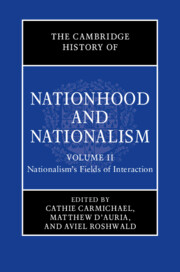Book contents
- The Cambridge History of Nationhood and Nationalism
- The Cambridge History of Nationhood and Nationalism
- The Cambridge History of Nationhood and Nationalism
- Copyright page
- Contents
- Figures
- Tables
- Contributors
- Part I Imperial and Postcolonial Settings
- Part II Transnational and Religious Missions and Identities
- 15 Liberalism and Nationalism: Trajectories of an Entangled Relationship
- 16 Marxism and the National Question
- 17 The Catholic Church
- 18 Islam and Nationalism
- 19 On Jewish Nationhood and Nationalism: A Historical Survey from Antiquity to the Establishment of the State of Israel
- 20 Buddhism
- Conclusion to Part II
- Part III Intersections: National(ist) Synergies and Tensions with Other Social, Economic, Political, and Cultural Categories, Identities, and Practices
- Index
- References
16 - Marxism and the National Question
from Part II - Transnational and Religious Missions and Identities
Published online by Cambridge University Press: 08 November 2023
- The Cambridge History of Nationhood and Nationalism
- The Cambridge History of Nationhood and Nationalism
- The Cambridge History of Nationhood and Nationalism
- Copyright page
- Contents
- Figures
- Tables
- Contributors
- Part I Imperial and Postcolonial Settings
- Part II Transnational and Religious Missions and Identities
- 15 Liberalism and Nationalism: Trajectories of an Entangled Relationship
- 16 Marxism and the National Question
- 17 The Catholic Church
- 18 Islam and Nationalism
- 19 On Jewish Nationhood and Nationalism: A Historical Survey from Antiquity to the Establishment of the State of Israel
- 20 Buddhism
- Conclusion to Part II
- Part III Intersections: National(ist) Synergies and Tensions with Other Social, Economic, Political, and Cultural Categories, Identities, and Practices
- Index
- References
Summary
Marx’s thought on nationhood emerged from the cosmopolitan legacy of the “radical Enlightenment.” It took shape in the crucible of European nationalisms, the persistence of dynastic multinational empires, and the appearance of socialism as a new political actor.1 In 1848, the national question was deeply intermingled with the question of class. As a minority current of socialism, at least until the end of the nineteenth century, Marxism promoted a new form of political internationalism of which the most significant expression was the foundation of the International Workingmen’s Association in 1864. A constitutive tension quickly appeared between this cosmopolitan aspiration – well synthesized by The Communist Manifesto’s sentence: “the workers have no country”2 – and the growing tendency of the nascent socialist movements to inscribe themselves into national patterns made of inherited cultures, languages, traditions, and social practices.
Keywords
- Type
- Chapter
- Information
- The Cambridge History of Nationhood and Nationalism , pp. 351 - 371Publisher: Cambridge University PressPrint publication year: 2023

